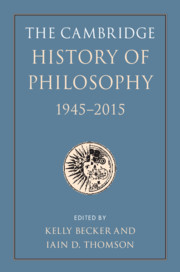Book contents
- The Cambridge History of Philosophy, 1945–2015
- The Cambridge History of Philosophy, 1945–2015
- Copyright page
- Contents
- Contributors
- Preface and Acknowledgments
- Introduction
- Part I Analytic Philosophy
- Part II Continental Philosophy
- Section Five Central Movements and Issues
- 26 Existentialism
- 27 Sartre and Merleau-Ponty on Freedom
- 28 Heidegger, Critical Theory, and the Critique of Technology
- 29 Authenticity and Social Critique
- 30 Hermeneutics in Post-War Continental European Philosophy
- 31 Feminist Philosophy since 1945
- 32 Philosophies of Difference
- Section Six Continental Moral, Social, and Political Philosophy
- Section Seven Continental Aesthetics and Philosophy of Religion
- Part III Bridge Builders, Border Crossers, Synthesizers, and Comparative Philosophy
- Part IV Epilogue: On the Philosophy of the History of Philosophy
- References
- Index
30 - Hermeneutics in Post-War Continental European Philosophy
from Section Five - Central Movements and Issues
Published online by Cambridge University Press: 08 November 2019
- The Cambridge History of Philosophy, 1945–2015
- The Cambridge History of Philosophy, 1945–2015
- Copyright page
- Contents
- Contributors
- Preface and Acknowledgments
- Introduction
- Part I Analytic Philosophy
- Part II Continental Philosophy
- Section Five Central Movements and Issues
- 26 Existentialism
- 27 Sartre and Merleau-Ponty on Freedom
- 28 Heidegger, Critical Theory, and the Critique of Technology
- 29 Authenticity and Social Critique
- 30 Hermeneutics in Post-War Continental European Philosophy
- 31 Feminist Philosophy since 1945
- 32 Philosophies of Difference
- Section Six Continental Moral, Social, and Political Philosophy
- Section Seven Continental Aesthetics and Philosophy of Religion
- Part III Bridge Builders, Border Crossers, Synthesizers, and Comparative Philosophy
- Part IV Epilogue: On the Philosophy of the History of Philosophy
- References
- Index
Summary
Taken in general terms, “hermeneutics” refers to the study of understanding and interpretation, and, traditionally, this study focuses on considerations of the art, method, and foundations of research in the arts and humanities. The study of hermeneutics has been developed and applied in a number of areas of scholarly inquiry, such as biblical exegesis, literary studies, legal studies, and the medical humanities. In the context of post-war Continental European thought, however, hermeneutics is brought into a novel philosophical context and, with this, comes to designate a philosophical movement – or, at least, a number of related philosophers and themes – concerned with the scope and limits of phenomenology, the character of human existence, the relation of the natural sciences and humanities, as well as a range of interrelated matters in the philosophy of history, the philosophy of language, the philosophy of art and aesthetics, practical philosophy, as well as in epistemology and the theory of meaning.
- Type
- Chapter
- Information
- The Cambridge History of Philosophy, 1945–2015 , pp. 399 - 415Publisher: Cambridge University PressPrint publication year: 2019
- 1
- Cited by



